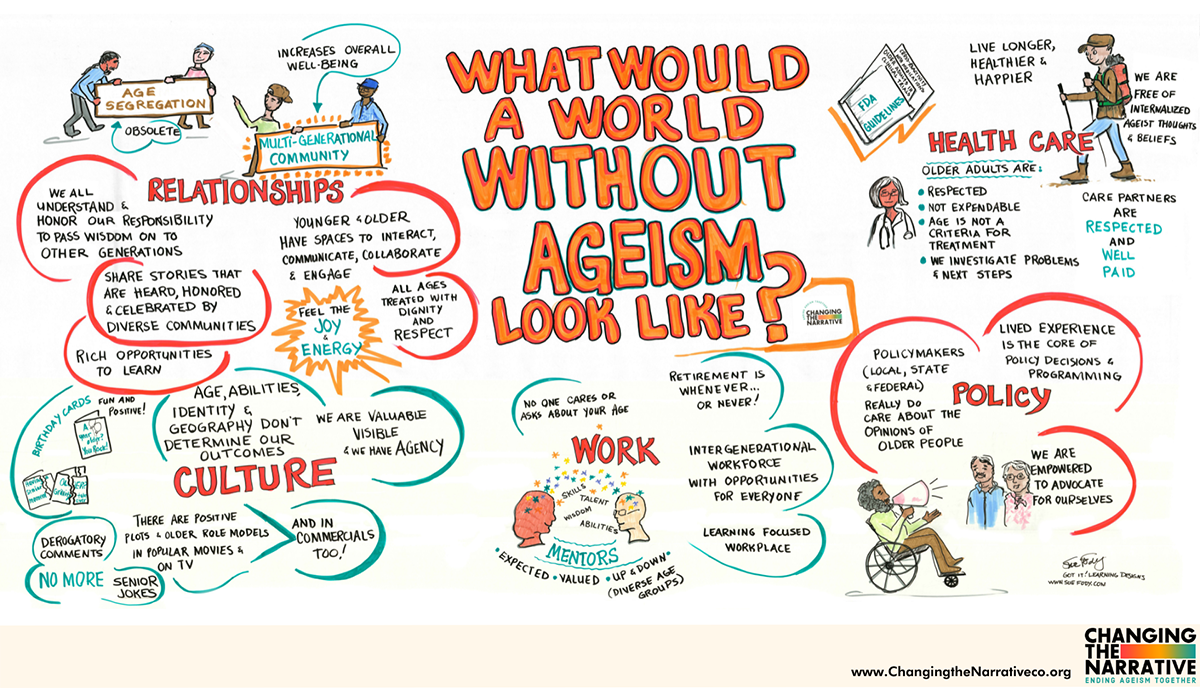October 7 is Ageism Awareness Day

Ageism is one of the most widespread and socially accepted forms of prejudice. As defined by the World Health Organization, ageism is “the stereotypes (how we think), prejudice (how we feel) and discrimination (how we act) towards others or oneself based on age.”
The American Society on Aging (ASA) is reaching out to its members and allies to collaborate with them “because together, we can make a difference. Ageism Awareness Day provides an opportunity to draw attention to the existence and impact of ageism in our society and how to reframe aging.”
Ageism is widespread. Stereotypes are reinforced on TV, through advertising, and in the media. We see it throughout our culture.
“We live in an aging society, which is a wonderful, remarkable thing,” says ASA’s Interim President and CEO Leanne Clark-Shirley, PhD. “But too many of us view aging with fear, denial and even hostility. We are all growing older. We can’t afford to limit ourselves and other people with such negative and harmful views … and why would we want to? Let’s lean into the opportunities, diversity, and full range of experiences that come with aging.”
In her book This Chair Rocks: A Manifesto Against Ageism, and through her many talks and writings, including this TED Talk, Ashton Applewhite reminds us that “it’s not the passage of time that makes it so hard to get older. It’s ageism, a prejudice that pits us against our future selves—and each other.
“Aging is not a problem to be fixed or a disease to be cured,” Applewhite says. “It is a natural, powerful, lifelong process that unites us all.” She urges us to “dismantle the dread and mobilize against the last socially acceptable prejudice.”
How can we act against ageism?
Awareness. We all have the power to change the narrative. Get educated. Be informed. We create change by how we think, what we say, and how we act. Check out the resources below to deepen your understanding of ageism, recognize it, and find new ways to make change.
Call out ageism. We are all more than our age. Don’t use age to classify people (that includes all ages). Acknowledge your own language and internalized ageism. How often do you find yourself saying “I’m too old for that!” or “You look good for your age.”? Here’s a thoughtful infographic from Changing the Narrative on Responding to Ageism.
Use age-inclusive communication. Learn about reframing aging and age-inclusive language to see how words, images, and stories matter. Many thanks to the FrameWorks Institute for its research, guides, and advocacy. Check out their richness of resources here.
Host conversations with friends and in your community. Hold a book club discussion about Becca Levy’s groundbreaking book, Breaking the Age Code: How Your Beliefs About Aging Determine How Long & Well You Live, about how our beliefs about aging affect our health, lifespan, likelihood of developing dementia, and more. Click here to link to a book discussion guide.
Additional Resources
Art Against Ageism is an alliance of creatives, artists, and activists committed to identifying, amplifying, and creating artistic endeavors that confront and address damaging stereotypes about age and aging.
Changing the Narrative is a campaign of NextFifty Initiative to end ageism, using evidence-based strategies, strategic communications, and innovative public-facing campaigns.
National Center to Reframe Aging is the central hub for the movement to reframe aging. The Reframing Aging movement is a long-term social change endeavor designed to improve the public’s understanding of what aging means and the many ways that older people contribute to our society.
Old School Clearinghouse is a compilation of free, vetted resources to educate people about ageism and to help dismantle it.
 Contributor Keri Pollock directs marketing and communications for Aging Wisdom, a care management and creative engagement practice based in Seattle. She is a member of the Age Friendly Coalition for Seattle and King County, serves on the Phinney Neighborhood Association (PNA) Board, and the Frye Art Museum Creative Aging Programs Advisory Committee.
Contributor Keri Pollock directs marketing and communications for Aging Wisdom, a care management and creative engagement practice based in Seattle. She is a member of the Age Friendly Coalition for Seattle and King County, serves on the Phinney Neighborhood Association (PNA) Board, and the Frye Art Museum Creative Aging Programs Advisory Committee.
Image credit (at top): Changing the Narrative, Ending Ageism Together, changingthenarrativeco.org
This article appeared in the October 2023 issue of AgeWise King County.
![Aging & Disability Services for Seattle & King County [logo]](https://www.agingkingcounty.org/wp-content/themes/sads/images/seattle-ads-logo.png)